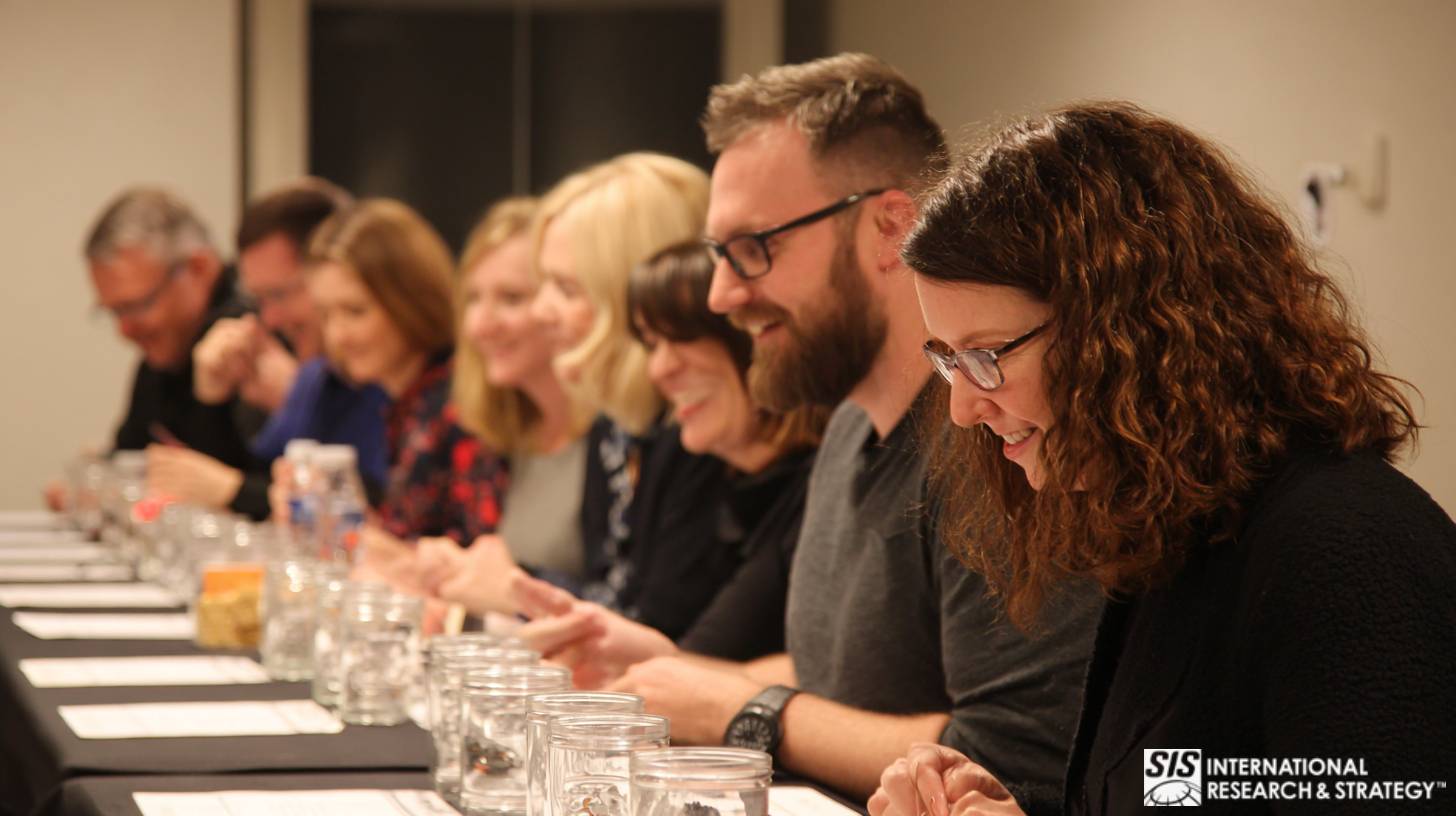味覚テスト検証市場調査

In the highly competitive food and beverage development industry, how can businesses ensure the accuracy and reliability of their taste testing results? Taste testing validation market research is the answer.
As consumers become more aware of different brands, reliable data is crucial to ensure that the taste resonates consistently with target audiences. Thus, taste testing validation market research emerges as a cornerstone, providing businesses with the confidence that their product decisions are rooted in valid and trustworthy insights.
Table of Contents
味覚テストの検証を理解する
Taste testing validation market research revolves around ensuring that the methods and results of taste tests are reliable and accurate. Validation is the process of confirming that taste tests measure precisely what they intend to.
Its rigorous focus on control, standardization, and verification distinguishes itself from regular taste tests. Taste testing validation market research goes beyond collecting feedback and dives deeper into ensuring that external factors, biases, or unforeseen influences do not skew the results.
味覚テストの検証が重要なのはなぜですか?

The food and beverage sector demands a heightened level of precision – and that’s why 味覚テスト検証市場調査 plays an indispensable role in meeting regulatory standards and enhancing product quality… But, why is its importance so pronounced?
- 結果の信頼性: Taste tests without validation might offer insights, but how specific can a business be of its repeatability? Market research ensures that a product’s reception isn’t just a one-time phenomenon but can be replicated with similar audiences and settings.
- データに基づく意思決定: In an industry where margins can be thin, making informed decisions is paramount. The robustness of taste testing validation market 研究 allows businesses to confidently move forward, knowing their strategies are rooted in reliable data.
- 信頼性: For stakeholders (investors, partners, or even consumers), knowing that a product has undergone rigorous taste testing validation enhances trust. It clearly conveys that the business values accuracy and is committed to delivering consistent quality.
- コスト効率: Mistakes in the food and beverage sector can be costly. Launching a product based on flawed data can result in significant losses.
Taste Testing Validation: Reliability Metrics & Quality Assurance Standards
| Validation Metric / Standard | Required Value / Benchmark | ソース |
|---|---|---|
| Test-Retest Reliability Coefficients | ||
| Test-retest correlation for taste recognition thresholds (general) | Good repeatability across measurements | PMC – Taste Recognition Study |
| Test-retest reliability for TASTE questionnaire domains | 0.55 to 0.86 (good across all domains) | PMC – TASTE Tool Validation |
| Pleasantness ratings correlation (high sugar concentrations) | 0.18 to 0.71 (11 of 20 statistically significant) | PMC – Taste Perception Reliability |
| Large magnitude correlation coefficient threshold | ≥0.50 for adequate reliability | PMC – Correlation Standards |
| Internal Consistency & Validity | ||
| Cronbach’s alpha for excellent consistency | >0.8 (excellent); >0.7 (acceptable) | PMC – Psychometric Validation |
| TASTE questionnaire Cronbach α range | 0.65 to 0.86 across domains | PMC – TASTE Tool Development |
| Correlation with sensory function tests (criterion validity) | Satisfactory with Sniffin’ Sticks & Taste Sprays | PMC – Criterion Validity Assessment |
| Sensory Profiling Replication | ||
| Correlation coefficient between replicate evaluations | >0.9 for 85% of significant attributes | ScienceDirect – Sensory Profiling Study |
| MANOVA product discrimination significance (1 vs 2 replicates) | Identical for 97% of datasets | ScienceDirect – Replication Analysis |
| Optimal number of replicates for sensory profiling | ~4 replicates; 2-3 typical for routine work | ScienceDirect – Replication Guidelines |
| Clinical Test Sensitivity & Specificity | ||
| Seven-iTT cut-off criterion for dysfunction (6 of 7 correct) | 84.3% sensitivity; 51.0% specificity | PMC – Seven-iTT Clinical Test |
| Cohen’s kappa agreement (fair agreement threshold) | κ = 0.25 (fair agreement) | PMC – Statistical Agreement |
| ISO International Standards | ||
| Sensory assessor selection and training standard | ISO 8586:2023 | ANSI Standards Blog |
| General methodology guidance for sensory analysis | ISO 6658:2017 | ISO Standards Catalog |
| Establishing sensory profile methodology | ISO 13299:2016 | ISO Standards Catalog |
| Quality control application guidance | ISO 20613:2019 | ISO Standards Catalog |
| Laboratory accreditation requirements | ISO/IEC 17025:2017 | Food Science & Technology |
| Sensory claim substantiation guidance | ISO 20784:2021 | Food Science & Technology |
| ASTM Testing Standards | ||
| Triangle test standard method | ASTM E1885-25 | ASTM Standards Store |
| Same-Different test method | ASTM E2139-25 | ASTM Standards Store |
| Tetrad test method | ASTM E3009-24 | ASTM Standards Store |
| Paired preference test | ASTM E2263-25 | ASTM Standards Store |
| Sensory claim substantiation guide | ASTM E1958-25 | ASTM Standards Store |
| Panel Performance Indicators | ||
| Panel performance criteria | Discriminability, repeatability, agreement, consistency | Academia – Panel Performance Review |
| Repeatability & reproducibility indices (desirable values) | Small values preferred for R&R indices | ScienceDirect – ANOVA Analysis |
| European accreditation guidance document | EA-4/09 G:2017 (updated to align with ISO 17025:2017) | Food Science & Technology |
| Quality Control Methods | ||
| In-out test for production conformance | Determines if sample meets specifications | E3Sensory Guidelines |
| Difference from control test | Indicates magnitude of difference from standard | E3Sensory Guidelines |
| Descriptive analysis for quality control | Provides intensity scores for sensory attributes | ISO 20613:2019 |
| Validation Applications | ||
| Olive oil extra virgin quality validation | Chemical composition + sensory characteristics required | Sirocco Consulting Case Study |
| IOC sensory methodology | Single attributes with intensity scales for rating | Sirocco Consulting Case Study |
| Panel screening for olive oil (taste threshold evaluation) | 13 aqueous solutions of 5 basic tastes tested | Sirocco Consulting Case Study |
| Training duration for bread sensory panel | 4 months with one training session per week | Sirocco Consulting Case Study |
味覚テスト検証市場調査を採用する企業のメリット
味や風味は主観的な性質を持つため、企業は製品の関連性と魅力を確保しながら革新を続けるよう常にプレッシャーを受けています。ここで味覚テストの検証市場調査が大きな変化をもたらします。この厳格な調査方法を採用することで企業が得られる魅力的なメリットは次のとおりです。
- 製品発売における自信の向上: With data from taste testing validation market research, businesses can launch new products or tweak existing ones with greater confidence, knowing they’re grounded in verified consumer preferences.
- データ駆動型イノベーション: In an era where data is king, having reliable, validated insights enables businesses to drive innovation that is not just creative but also aligned with actual consumer preferences.
- 最適化されたマーケティング戦略: 製品のフレーバー プロファイルが検証されているとわかれば、マーケティング チームに強固な基盤が与えられます。マーケティング チームは、確かな味覚テスト検証市場調査に基づいて、消費者の要望を真に満たす製品として位置付ける、説得力のあるマーケティング戦略を策定できます。
- ブランドの評判の強化: 消費者の共感を呼ぶ製品を継続的に提供することで、ブランドの信頼性が高まります。ブランドの製品が検証済みの調査によって裏付けられていることを消費者が知れば、信頼と忠誠心が高まります。
- ビジネスリスクの軽減: 新しいフレーバー領域に進出したり、既存のフレーバーを微調整したりするには、固有のリスクが伴います。味覚テスト検証市場調査は、ビジネス上の意思決定が堅牢で信頼性の高いデータに基づいていることを保証することで、これらのリスクを軽減するのに役立ちます。
- カスタマイズされた製品の提供: Different markets might have varied taste preferences. Through validated research, businesses can tailor their offerings to regional or demographic-specific tastes, thereby ensuring broader appeal.
チャンス
As consumer preferences continue to evolve, businesses in the food and beverage industry must adapt to meet these dynamic needs. By leveraging taste testing validation market research, companies can uncover several untapped opportunities:
- 新規市場への参入: 新しい人口統計や地理的市場への進出は困難です。しかし、市場調査を通じて、企業は地元の味の好みに関する洞察を得ることができ、それに応じて提供品を調整し、市場参入を成功させることができます。
- 製品ラインの拡張: Existing products can be innovated by introducing new flavors or variants. Validated taste tests can identify which potential extensions will resonate most with target consumers.
- パーソナライズされた消費者体験: With the rise of personalized nutrition and diets, there’s an opportunity to use 味覚テスト検証市場調査 to develop products tailored to niche consumer segments, catering to specific taste preferences or dietary needs.
- 透明性を通じたエンゲージメント: Modern consumers value transparency. Businesses can showcase their commitment to delivering truly consumer-centric products by sharing insights and results from their validated taste tests, enhancing brand trust.
- 持続可能性と倫理的な好み: 持続可能性と倫理的な生産に基づいて選択する消費者が増えています。企業は、味覚テストを通じて環境に優しい、または倫理的に調達された原材料の受け入れを検証し、消費者の味の期待に応えられるかどうかを確認できます。
- 共同イノベーション: シェフ、食品科学者、栄養士と協力して、ユニークで魅力的な製品を開発します。市場調査により、これらの共同イノベーションに関するフィードバックが得られ、消費者の嗜好に合致していることを確認できます。
- Packaging and Presentation Feedback: While the primary focus is on taste, how a product is presented can influence perception. Businesses can validate the taste and overall experience – including packaging and presentation – ensuring a holistic positive response.
- タイムリーな適応: Regular market research can identify shifts in consumer preferences early, enabling businesses to adapt swiftly.
企業向け市場調査における味覚テスト検証の課題
While taste testing validation market research offers many benefits and insights, it’s not without its challenges. Businesses seeking to harness their power must navigate several hurdles such as:
- 味覚の主観性: 味覚は人それぞれ異なるため、結果を標準化するのは困難です。ある人が美味しいと感じるものを、別の人は美味しくないと感じるかもしれません。こうした多様な反応を集約して有意義な洞察を引き出すことは、市場調査担当者にとって困難な場合があります。
- 適切な参加者の募集: 多様で代表的なサンプルを確保することは非常に重要です。ターゲット市場の人口統計と好みを反映する適切な参加者の組み合わせを見つけるには、多くのリソースが必要になる場合があります。
- 文化の違い: 企業がグローバルに拡大するにつれ、味覚の好みにおける文化的な違いを理解し、考慮することが不可欠になります。しかし、多様な文化間で味覚テストを標準化することは困難です。
- 技術統合: While technology can enhance 味覚テスト検証市場調査, integrating the latest tools and platforms requires expertise and can pose challenges regarding training and adaptability.
Taste Testing & Sensory Analysis Market Growth Projections
Global market value projections showing compound annual growth rates (CAGR) across multiple market segments through 2033
What Makes SIS International a Top Taste Testing Validation Market Research Company?
SISインターナショナル is a trusted leader in taste testing validation, offering businesses precise and reliable insights to ensure their products align with consumer expectations. With over 40 years of 市場調査経験, state-of-the-art methodologies, and a focus on actionable results, SIS helps brands succeed in competitive industries.
Expertise in Taste Testing Validation
Taste testing validation requires a deep understanding of consumer preferences and advanced research techniques. SIS excels in this field, using proven methodologies to confirm product quality, consistency, and appeal, ensuring your products meet market standards.
State-of-the-Art Research Facilities
Our New York-based facilities have cutting-edge sensory analysis tools and controlled environments. These resources enable SIS to conduct precise evaluations, ensuring that your products are validated with the utmost accuracy.
Diverse Consumer Panels for Broader Insights
New York’s diverse population allows SIS to recruit participants from varied backgrounds, lifestyles, and demographics. This ensures our taste testing validation reflects the preferences of a wide and representative consumer base.
カスタマイズされたテストソリューション
Every product and brand is unique, and 戦略情報システム customizes its validation processes to align with your goals. Whether testing new recipes, reformulated products, or variations across markets, we design our studies to deliver insights that meet your needs.
Over 40 Years of Market Leadership
戦略情報システム has been a pioneer in market research for decades. Our extensive experience ensures that industry expertise, rigorous processes, and proven methodologies back your taste testing validation.
Affordable, High-Quality Research Services
We offer premium taste testing validation at competitive rates, providing exceptional value to businesses of all sizes. SIS ensures that world-class research is accessible without compromising quality or results.
Rapid and Efficient Turnaround Times
In fast-moving industries, timely insights are critical. SIS delivers results quickly, enabling you to make data-driven decisions and adjust strategies without delays.
Insights That Drive Product Excellence
SIS doesn’t just validate your products—we provide actionable recommendations. Our insights help you refine flavors, improve consistency, and enhance overall appeal to ensure your products meet and exceed consumer expectations.
Commitment to Objective Research
Taste testing validation demands impartiality, and SIS is dedicated to providing unbiased results. Our methodologies focus purely on consumer perceptions, ensuring accurate and trustworthy findings.
A Strategic Partner for Long-Term Success
SIS goes beyond research execution by collaborating with clients to ensure their success. From project planning to detailed reporting and recommendations, we act as a strategic partner invested in your product’s success.
ニューヨークの施設所在地
11 E 22nd Street、2階、ニューヨーク、NY 10010 電話: +1(212) 505-6805
SISインターナショナルについて
SISインターナショナル 定量的、定性的、戦略的な調査を提供します。意思決定のためのデータ、ツール、戦略、レポート、洞察を提供します。また、インタビュー、アンケート、フォーカス グループ、その他の市場調査方法やアプローチも実施します。 お問い合わせ 次の市場調査プロジェクトにご利用ください。
